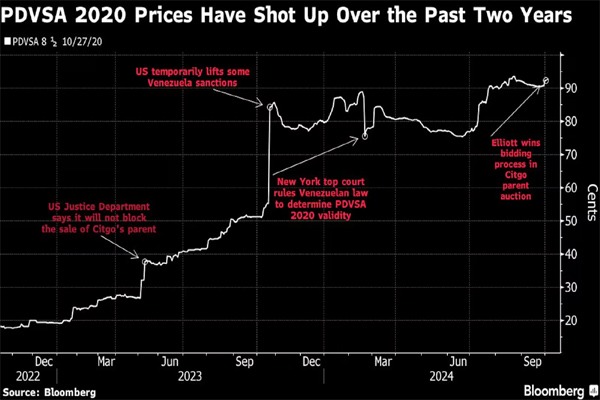
Nicolle Yapur and Maria Elena Vizcaino, Bloomberg News
CARACAS/NEW YORK
EnergiesNet.com 10 08 2024c
Venezuela’s state oil company hasn’t paid bondholders a dime in the last five years. Yet, investors who’ve held on to one particular security are getting ready for a massive payoff.
The Petroleos de Venezuela SA bond that matured in 2020 has emerged as the lone bright spot in the $60 billion pile of defaulted Venezuelan government and oil bonds. It trades for 93 cents on the dollar — with some analysts arguing it has room to gain — while all the others are quoted for less than 17 cents.
The price reflects more than just market optimism. The bonds are set to be paid off after an Elliott Investment Management affiliate late last month won the bidding process for one of PDVSA’s subsidiaries for $7.3 billion. That will make Elliott responsible for satisfying the bondholder claims because the collateral on the notes is shares in an affiliated company — the parent of Citgo Petroleum Corp.
It represents a rare victory for investors who have otherwise seen their holdings in Venezuela debt pummeled by years of economic collapse, political isolation and the downfall of an oil industry that provides the vast bulk of the nation’s dollar earnings. Any hopes of a full-scale debt restructuring were dimmed in July when President Nicolas Maduro made the dubious claim he won the presidential election, further isolating his government.
Some investors scooped up the PDVSA 2020 bonds at a huge discount. Two years ago, they were trading for less than 20 cents on the dollar.
“We are glad that there is finally a deal” for Citgo, said Lee Robinson, chief investment officer of the Altana Wealth, who launched a fund to load up Venezuelan debt about four years ago. “It means the money is there for the bondholders.”
Just how much they will get paid now rests squarely with Elliott, a New York-based activist investor that was founded by billionaire Paul E. Singer. In Latin America, Elliott is perhaps best known as a creditor that dragged Argentina to court to win a multibillion dollar payout, going as far as to seize an Argentine naval ship along the way.
Elliott’s offer includes a plan to set up an escrow for the bondholders’ claim. As an alternative, the two sides could negotiate a settlement.
Elliott and its affiliate that won the bid, Amber Energy Inc., didn’t respond to messages seeking comment.
Elliott’s win is the outcome of a complex legal process to find a buyer for the parent of Citgo, a Venezuela-owned foreign asset that operates three refineries in the US, pipelines, terminals and fuel distribution channels. The proceeds will go to pay back a long list of creditors who are collectively owed around $20 billion by the Venezuelan government.
Some creditors are likely to walk away with nothing. But PDVSA 2020 bondholders are at the top of the pile. The notes have jumped 2 cents on the dollar since Elliott’s emerged as the winner last month. The notes edged higher on Monday, according to indicative pricing data collected by Bloomberg.
At Barclays Plc. and EMFI Securities, analysts are recommending clients buy the bonds, citing more upside. Jason Keene, a sovereign credit strategist at Barclays, estimates the claim is worth $2.6 billion when including accrued interest. As of end of September prices, the market value of the notes was around $1.53 billion.
While court filings “detailed plans for escrowing sufficient cash pending the outcome of New York litigation, we believe that relevant parties will be incentivized to settle prior to closing,” Keene wrote in a note.
Court Process
A legal process still has to play out before the sale takes place. Judge Leonard Stark canceled a November sale hearing after other bidders logged complaints about a lack of transparency in the process. There isn’t a new date yet, suggesting he needs time to process the appeals, Oppenheimer & Co. analysts wrote in a note.
Plus, some creditors have decided to take their claims to other courts, seeking to bypass sale proceedings. Elliott’s offer is contingent one those additional lawsuits being blocked, according to a filing by the court-appointed special master overseeing the sale process.
Despite the delay, investors like Francesco Marani at boutique investment firm Auriga, say a payoff is in sight, even as the rest of the Venezuelan debt pile languishes.
“This is going to get a quicker resolution that the unsecured PDVSA and sovereign, which are only going to move in the case of a restructuring,” he said.
bloomberg.com 10 07 2024









